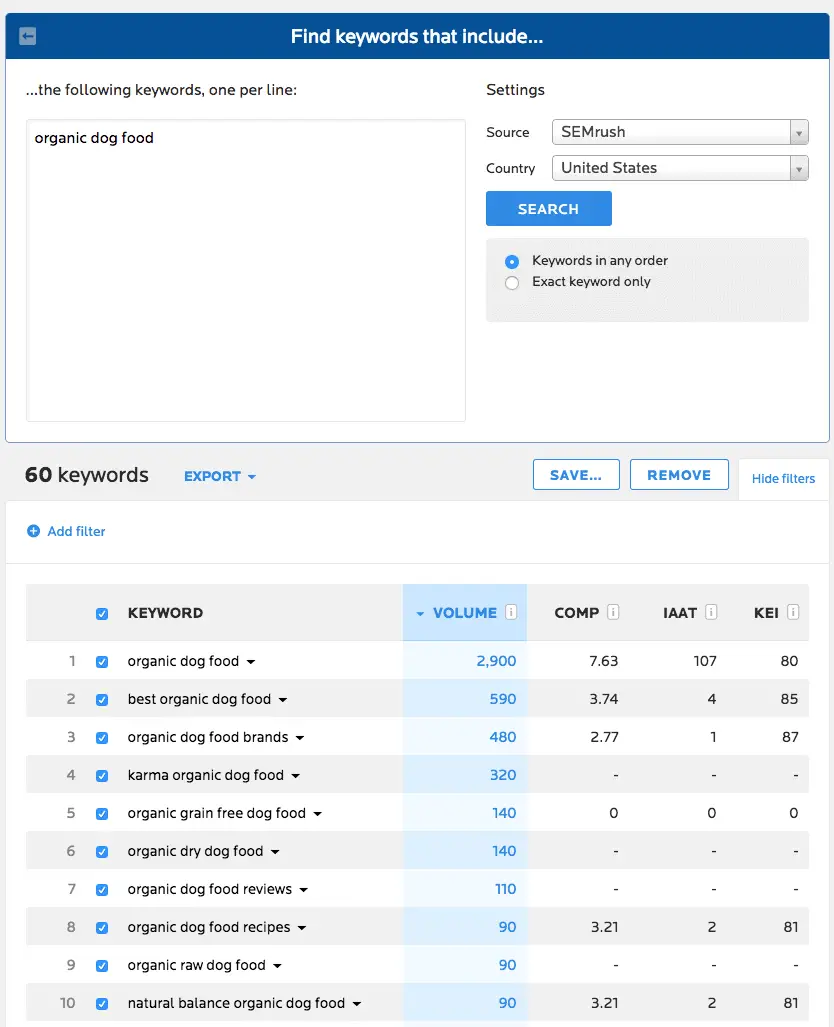Picking the right keywords for search engine optimization is one of the most important steps you can take in SEO. It can lead to volumes of traffic arriving on your web site for free if you do it right. If you do it wrong you’ll end up with a trickle of visitors and a lot of wasted time and effort.
The best way to start your research is to make a list of the keywords – or more accurately “keyword phrases” you think a web search would type into a search engine such as Google or Bing to find your web site. Then search for them on Google and see what web sites and content come up. If sites that you compete with come up then you’re likely on to the right keyword phrases.
Quick Keyword Research Strategy
The next thing to do is to try combinations and variations on the keyword phrase and see what Google suggests in its pop out search menu. These are phrases a known to be searched on in Google index and likely have good traffic behind them. For example, start typing “dog food” and Google will suggest common searches that use that keyword.

For the time-pressed SEO, this could be all that you need to determine what keyword phrase could be valuable.
Of course it doesn’t tell you the best keyword phrases or the search volume you’ll likely to get by winning a top spot with this phrase. But this is a quick keyword research strategy that can be done in a few precious minutes.
Google’s Keyword Research Tool
Google has a nice free keyword research tool called Keyword Planner which is built into Google Adwords. That’s the search engine’s paid keyword ad suite and it is a good place to do your SEO keyword research.
Using it you’ll get a good sense of what a particular keyword is worth per click and what the search volume is for the keyword phrase.
To find it visit Google Adwords (click) then log-in with your Google account (a Gmail log-in will work) or create a new one because you will need this for a Google Analytics account and Google Webmaster.
After logging in to Google Adsense, click the “Tools” menu to the far right, then choose the research option you find most appealing. I like the “Search for new keywords using a phrase, website or category” option.
Google Keyword Planner is a handy free keyword research tool built into Google Adwords
Paid Keyword Research Tool: WordTracker
At Cyberwalker Digital we like to use WordTracker, a paid that runs $27 to $69 per month depending on which plan you choose. The base plan works fine unless you plan to do international search engine optimization and need multiple country data.
WordTracker lets you input keywords to find related and suggested keywords that are getting good search volumes. Once you have identified a series of phrases you can use a secondary tool to determine search volumes. It also lays out for you several key indicators as follows:
VOLUME: This is the number of searches estimated for the keyword phrases per month.
COMP: This is competition rating. The higher the number the more competition there is to win a high ranking on this keyword. “Cars” has a volume of 1.2 million searches per month and a COMP value of 45.22. So that would be a tough keyword to win. Of course the pay off would be high. The keyword phrase “iphone 6” has more than 6 million searches but a COMP value of 35.65. This value is handy to compare similar keywords however. Use the volume and competition values to determine which is a better keyword phrase to chase.
IAAT: This means “In Anchor and Title” and shows how many web sites have the keyword phrase in their page titles and linked in inbound links from another site. It’s an indictor of keyword popularity and shows what you are up against. If the IAAT is a high number you are for some hard work to win ranking on the keyword.
KEI: This is Keyword Effectveness Index and goes up when the keyword popularity increases and goes down when there is lots of competition. You will never see a KEI larger than 100. You want high volume and low competition so a moderately rated KEI is likely to be attractive. Use it to compare keywords too.

The Ultimate Keyword Research Strategy
So what to do? Design a keyword phrase portfolio that has a blend of low volume keywords that are easy to win and moderately high volume keyword phrases that you have a shot at with some effort.
You might want to add a few “golden” keyword phrases that would would love to win. Tracking these will give you an indicator of how successful you are against top competitors. In a niche these are fun because with time and with great content and persistence you can win them. They are the golden eggs you can attain. If you can win national single word keywords (like “cars”) then you’re doing really well.
Even a regional win like “cars for sale in Tampa” will take some effort. If your business has a local angle then its worth making this kind of keyword phrases of of your golden eggs.
Bottom line though: start with the easy stuff. Cut your chops. Learn what works and get more aggressive as you develop your skills. And be sure to celebrate every win as your organic search volume grows.


